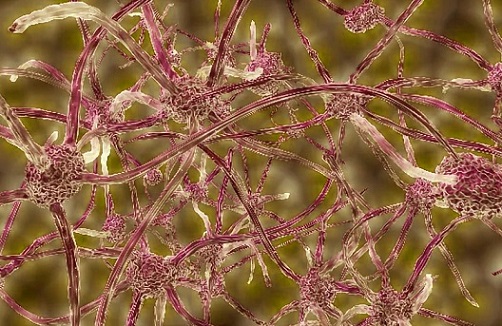New Hope in Nerve Repair as Scientists Discover Natural Immune Protein That Heals Nerves and Fights Infection
Nikhil Prasad Fact checked by:Thailand Medical News Team Apr 01, 2025 3 weeks, 21 hours, 47 minutes ago
Medical News: A groundbreaking study led by scientists from several top research institutions in China and the United States is shedding new light on a naturally occurring protein called defensin - a powerful immune molecule found in humans, animals, plants, and even insects - that may revolutionize the treatment of peripheral nerve diseases.
 New Hope in Nerve Repair as Scientists Discover Natural Immune Protein That Heals Nerves
New Hope in Nerve Repair as Scientists Discover Natural Immune Protein That Heals Nerves
and Fights Infection
Peripheral nerve diseases affect millions around the world, causing debilitating symptoms like pain, muscle weakness, numbness, and impaired coordination. These diseases occur when nerves outside the brain and spinal cord are damaged due to injury, infection, genetic disorders, or conditions like diabetes. Current treatment options, including surgery and physical therapy, are often ineffective or slow in producing results, leaving many patients with long-term or even permanent disabilities. This
Medical News report explores an exciting new frontier in nerve healing based on natural immune system defenses.
The new review study, conducted by researchers from Shenzhen Second People's Hospital, Peking University Shenzhen Hospital, the National and Local Joint Engineering Research Center of Orthopedic Biomaterials, the Shenzhen Key Laboratory of Orthopaedic Diseases and Biomaterials Research in China, and the Life Sciences Institute at the University of Michigan in the United States, focuses on how defensins - small, antimicrobial peptides - can regulate immune responses, control inflammation, and even repair nerve tissues.
Defensins A Natural Defense Force
Defensins are part of the body’s first line of defense. These peptides are naturally equipped to kill bacteria, viruses, and fungi, and are involved in regulating inflammation and immune system activity. The study revealed that different types of defensins - such as α-defensins, β-defensins, and θ-defensins - have unique abilities to influence nerve healing, making them potent candidates for developing treatments against nerve damage.
One standout form, α-defensin NP1 derived from rabbits, was shown to significantly improve recovery in rat models of sciatic nerve injury. When administered after nerve trauma, NP1 helped increase the thickness of the myelin sheath (which insulates nerves), improved nerve conduction speed, and promoted muscle regeneration. These effects were found to be on par with standard treatments using nerve growth factors.
Furthermore, α-defensin was shown to reduce inflammation and encourage the activity of Schwann cells - the support cells essential for nerve repair - by activating specific signaling pathways like NF-κB. This opens the possibility of developing injectable or implantable biomaterials containing defensins to stimulate faster and more complete nerve healing.
Defensins Go Beyond Healing
The study also highlighted how defensins may serve as a bridge between immun
e system regulation and nerve function. For instance, β-defensins have been found to influence conditions like Parkinson’s disease, chronic itch, and inflammation by interacting with neural receptors and immune cells. They could also serve as early diagnostic markers based on how their levels change in injured or diseased nerve tissues.
Even plant and insect defensins show promise. A peptide from lentils demonstrated anti-fungal and immune-boosting activity without harming healthy human cells. An engineered insect defensin was also found to reduce systemic inflammation in mice with sepsis. These findings suggest that modified or cross-species defensins could be developed into therapeutic agents with minimal side effects.
Building the Future of Nerve Repair
Scientists are now experimenting with combining defensins with tissue engineering and biomaterials to create wound-healing scaffolds that fight infections while promoting tissue regeneration. These hybrid materials could revolutionize surgical repair techniques, especially in cases where infection risk is high or traditional grafts are limited.
The researchers also noted that θ-defensins - cyclic peptides found in primates - could block harmful enzymes involved in nerve inflammation and degeneration, showing potential for diseases like Alzheimer’s and multiple sclerosis.
A New Direction in Medicine
This new study provides strong evidence that defensins are not just antimicrobial warriors but also key players in restoring damaged nerves. With further research, defensins could be used to create targeted therapies for a wide range of nerve-related conditions, from traumatic injuries to autoimmune nerve disorders.
In conclusion, the study paints a hopeful picture of defensins as multifunctional molecules capable of fighting infections, calming harmful inflammation, and kickstarting nerve regeneration. Their natural origin, low toxicity, and broad-spectrum activity make them ideal candidates for future nerve disease treatments. As researchers continue to uncover their full potential, defensins may become a cornerstone of regenerative medicine and neurological recovery.
The study findings were published in the peer reviewed journal: Brain X.
https://www.thailandmedical.news/news/brain-blood-flow-abnormalities-found-in-older-adults-with-long-covid
For the latest on Nerve Repair, keep on logging to Thailand
Medical News.
Read Also:
https://www.thailandmedical.news/news/the-phytochemical-genipin-from-gardenia-plants-can-help-regenerate-damaged-or-diseased-human-nerves
https://www.thailandmedical.news/news/complement-protein-c5a-boosts-nerve-regeneration-after-injury
https://www.thailandmedical.news/news/new-hope-for-nerve-repair-breakthrough-in-axon-regeneration
https://www.thailandmedical.news/pages/thailand_doctors_listings
https://www.thailandmedical.news/articles/hospital-news
